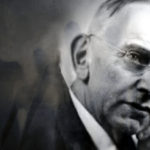Tenasukh refers to the transmigration of souls, the doctrine that after death the soul moves on to inhabit another body. This cycle continues as long as necessary. This doctrine is called reincarnation. It is not Islamic.
Belief in some form of reincarnation can be found in almost all societies, whether primitive or sophisticated. Variations exist according to the local and regional differences in faith and popular culture. In the most materialistic societies especially, whose formal culture denies any spiritual life, there is almost a fashion for pseudo-religious belief among certain small circles of people who claim for whatever reason that the souls of the dead wander about, sometimes taking physical form, and influence the living until they (the spirits) settle into their “new” bodies. Rather than going into such digressions, I will describe its main tenets and consider it from the Islamic viewpoint.
One argument for the antiquity of reincarnation is the “evidence” in ancient literature, such as tales of metamorphosis for example, Ovid’s colorful extravagances of that name, in which “deities” take on human and animal forms, human beings assume a diversity of different shapes, and so on. But these tales do not constitute a doctrine; the doctrine proper is that an individual spirit must pass through every “level” of creation, every species of life form, whether animate or inanimate, sentient or non-sentient. The emigration of a human soul to another human body is called “transmigration,” and to an animal body, “metamorphosis.”
If we reflect upon this, we soon realize that the doctrine is an elaboration on the soul’s immortality. Its kernel, the soul’s immortality, is true; the rest is not. The doctrine also may have arisen from seeing similar physical and other traits between parents and offspring. In other words, the biological phenomenon of heredity, perfectly explained by genetics, are given a less intelligible, indeed irrational, explanation by the doctrine of reincarnation.
In addition, we can see a correlation between reincarnation and such similar false beliefs asincarnation (the doctrine that God takes on human form or has a body in human form) and union(the union of a human soul with God). This doctrine also may come from the belief of a universal soul taking on different forms, which gave rise to monism.
The doctrine is said to have emerged in the Nile basin and then spread as far a field as India, for example, and then westward to Greece. There, the eloquence of philosophers rationalized it (incredibly, it seems to us) into a source of consolation and hope for those who long for eternity. Among the major religions, the doctrine entered Judaism through Kabbalists, via Jewish thinkers into Christianity, and finally into the ideas of some Sufis despite the hard labors of Muslim theologians to refute such a distortion.
To support it, every apologist put forward some “evidence.” For instance, the Kabbalists mention the transformation of Niobe (mentioned in the Old Testament) into a marble statue, and of Prophet Lot’s wife into a pillar of salt. Others have referred to a literal transformation of Jews into monkeys and pigs.
Another argument for it is that it explains an animal’s instinct and intelligence, and the splendors of the plant kingdom, as they once had human intelligence and vitality. This idea debases humanity and shames its proponents. It is really difficult to accept that such an assertion, even if made on the spur of the moment, could be made by people of any understanding. Certainly there is a program and a predetermined destiny for plants and inanimate creations. But it is rather far-fetched to trace the harmony and order we see in the plant or mineral kingdoms to souls that formerly lived as or in human beings. Actually, plants and trees have a certain life, a plant-life, a direction of growth toward light and moisture. But this does not mean that this is the activity of a formerly human soul, or a soul on its way up the levels of creation.
Despite efforts to corroborate this, no one has ever received a message from a plant confirming that it contains a soul that once belonged to a human being, nor have we heard any person say that they were once souls in a plant or animal. Tabloids and other media spread tales of people recollecting “past lives,” even recounting specific incidents. Where these claims are not totally absurd and ridiculous, their substance can easily be explained as recollections of what the individual has seen or read and then, knowingly or otherwise, elaborated and transformed as in any ordinary human fiction.
The fact that Niobe and Prophet Lot’s wife were transformed into marble and salt statues, respectively, even if accepted literally, does not prove reincarnation. What we have here is a physical transformation having nothing to do with the soul’s transmigration. Petrified bodies are not an arcane phenomenon: many such corpses have been found preserved by the absolute dryness of volcanic ashes. Consider the case of Pompeii, a city destroyed by a sudden volcanic eruption and unearthed from layers of ash only centuries later. Subsequent excavations revealed numerous Niobe-like petrified bodies. In these ruins, and in the petrified faces and bodies of those so busy in their self-indulgent vices and so secure in their arrogance, we can, if we wish, read the signs of Divine wrath and punishment. Perhaps these figures had their way of life solidified in ash and thus preserved so that future generations might witness and take heed. To interpret them as evidence of reincarnation is simply untenable. Belief in reincarnation in Egypt, India, and Greece developed out of a distorted version of belief in the Hereafter and from a longing for immortality of the soul. Neither in Akhenaten’s Egypt nor Pythagoras’ Greece knew of reincarnation. Akhenaten believed when human life ends, a different one starts in heaven. As soon as one dies, one’s soul sets off on its journey to reach “the Greatest Court” in heaven. It goes so high that it reaches the presence of Osiris, and hopes to give an account of itself in words like these: “I have not done falsehood against men. I have not impoverished my associates. I have done no wrong in the Place of Truth. I have not learned that which is not. I have done no evil. I have not made people labor daily in excess of what was due to be done for me ..” Those who can so speak join Orisis’ congregation; those who cannot, whose evil deeds outweigh their good, are hurled into Hell and tortured by demons.
Such sound belief also is witnessed in epitaphs relating to Akhenaten’s religion as follows: “What You have done is too much, and our eyes cannot perceive most of them. O One, Only God! No one possesses such might as You have. It is You who have created this universe as You wish and You alone. It is You who decree the world suitable for human beings, for all animals, whether big or small, whether they walk on the Earth on their legs or they fly up in the sky on their wings. And it is You alone who sustain and nourish them. Thanks to You, all beauties come into existence. All eyes see You by means of those. Verily, my heart belongs to You (You are in my heart).” The ideas quoted verbatim above were believed as truth some 4,000 years ago in Egypt.
Likewise, in ancient Greece, belief in the Resurrection and the soul’s immortality were quite sound. The great philosopher Pythagoras, for example, believed that the soul, on leaving the body, acquires its own kind of life. In fact, any soul has this kind of life even before it quits the Earth. It is commissioned with some responsibilities on Earth. If it commits any evil, it will be punished, thrown into Hell, and tormented by demons; if it does good, it will be given a high rank and blessed with a happy life. Allowing for changes that might have been made in his views over time, we can still see that there are fundamental similarities with the Islamic creed of the Resurrection. Plato’s account is not so different either. In his famous The Republic, he says that the soul on leaving the body forgets the material (corporeal) life totally, and ascends into an appropriate spiritual realm saturated with wisdom and immortality, where it is free from all scarcity, deficiency, error, fear, and from the passion and love that afflicted it on Earth. Being free of all evil consequences of human nature, it is blessed with eternal bliss.
In essence, the doctrine of reincarnation, despite its numerous variations, is a distorted version of a sound belief: the soul’s immortality and the intrinsic human desire for eternity. In addition, the human soul has an existence that is different from, and even independent of, that of the body. For example, St. Thomas Aquinas, one of the most famous Christian theologians and philosophers, writes that the key concept of humanity is that the soul and body are united in an apt composite. He adds that animal souls develop with animal bodies, whereas human souls are specially created at some time during early development.
Over time, borrowings from or interactions with certain ancient beliefs have caused such false doctrines to filter into sound beliefs. One cannot miss the relation between reincarnation and the deification of Jesus, which is related to such false doctrines as union and incarnation.
In a comparable way, no doubt through mistaken (whether deliberate or not) translations from the original language and later distortions, the ancient Egyptian, Indian, and Greek religions became unrecognizable. The doctrine of reincarnation may well be one such alteration from an originally sound conception of the soul’s immortality and its return to the Divine Judgment. After reincarnation was inscribed into the beliefs of the ancient Egyptians, it became one of the central themes of songs and legends throughout the Nile region. Elaborated further with the eloquent expressions of Greek philosophers, it became, with the expansion of Greek influence, a widespread phenomenon.
Hindus consider matter the lowest manifestation of Brahman, and deem the convergence of body and soul as demeaning to the soul, a decline into evil. When a person dies, the only “death” is that of the physical body. The mind, which contains a person’s mental impressions, continues after the body’s death. When the person is reborn, the “birth” is of a new physical body accompanied by the old mind with the impressions or “grooves” from previous lives. However, this process doesn’t go on eternally. When the soul attains God-realization or Self-realization, the law of karma is transcended, the Self gives up its identification with the body and mind, and regains its native freedom, perfection and bliss. Hindus are polytheistic. One of their gods is Vishnu. His preserving, protecting powers have been manifested to the world in a variety of forms, called Avatars, in which one or more of his divine attributes were embodied in the shape of a human being or an animal or a human-animal combined form, possessing great and sometimes supernatural powers. All these Avatars of Vishnu appeared in the world either to correct some great evil or to effect some great good on earth. These avatars are ten in number, however, the Bhagwad Purana increases them to twenty two and adds further that are innumerable. It is important to note that the all the Avatars are earthly form of Lord Vishnu. The tenth and the last avatar of Vishnu, Kalki, is yet to appear. Kalki will appear at the end of the Kalyuga, when everything will have been upset and the world . This avatar will appear seated on a white horse with a drawn sword blazing like a comet.
According to the Vedanta, one of the important Hindu religious books, the soul is a part, a fragment, of Brahman that will never be free of suffering and distress until it returns to its origin. The soul achieves gnosis by isolating itself from the ego and all wickedness pertaining to the ego, and by running toward Brahman, just as a river flows to a sea. When the soul reaches and unites with Brahman, it acquires absolute peace, tranquility, and stillness. This doctrine also is found in the Buddhist idea of Nirvana. There is an abatement of active seeking, and a passivity of soul in the latter, whereas the soul is dynamic in Hinduism.
Some Jewish sects adopted reincarnation. After refusing belief in the Resurrection and Judgment, the followers of such people, who can be inordinately covetous of life yet remain fascinated by the soul’s immortality, could do little else than accept reincarnation. Later, the Kabbalists transferred it to the Church of Alexandria through certain regional monastic orders. The doctrine has had a negligible effect on Islam. However, it was introduced to Muslims by the Gulat-i Shi‘a (an extremist Shi‘a faction).
All ancient, new, and contemporary versions of reincarnation have one root characteristic: belief in incarnation. There is a shared failure of intellect to both grasp and accept the Absolute Transcendence of God. Corrupted by this failure, people believe that the Divine mixes with the human, and that the human will (or can) mix with the Divine. This error is, except for Islam which has retained its strict purity of belief, all but universal. The central figure in each distorted belief is an incarnation or reincarnation─Aten in Atenism, Brahman in Hinduism, Ezra (Uzair) in Judaism, Jesus in Christianity, and ‘Ali in the Gulat-i Shi’a faction who, if they exist at all within Islam, must be seen as on its very outermost fringes. Allegations that some Sufi writings and utterances support reincarnation are either plainly malicious or the result of an absurdly literal understanding of their highly symbolic and esoteric discourse. Islamic scholars and theologians, certainly among the 90 percent of Sunnis, unanimously and unequivocally reject reincarnation as contrary to Islam. This is true of scholars in every field jurisprudence, theology, Qur’anic commentary (tafsir), or Hadith commentary. Their reason: the absolute centrality in Islam that each individual lives and dies according to his or her own destiny, carries his or her own load, will be resurrected and called individually to answer for his or her intentions and actions and their consequences, and will be judged individually by God (with perfect justice) according to the same criteria.
We now present the cardinal reasons why Islam rejects reincarnation.
- Belief in Islam requires belief in (both bodily and spiritually) Resurrection and Judgment, when justice is meted out to each individual soul according to that individual’s record in life. If the individual soul passes into different lives, in which form or personality will it be resurrected, commanded to give account, and rewarded or punished?
- Despite its darkness and density in contrast to water, air, and light, earth is the means and source of all the varieties of the works of Divine art, in meaning it has some superiority to the other elements. Also, despite its density, on account of being comprehensive and provided it is purified, the human selfhood gains some kind of superiority to his/her other senses and faculties. Likewise, the human body is a most comprehensive and rich mirror to the manifestations of the Divine Names. It has been equipped with the instruments to weigh and measure the contents of all of the Divine treasuries. For example, if the sense of taste in the tongue was not the origin of as many measures as the varieties of food and drink, it could not experience each and recognize them; it could not measure them. Furthermore, the instruments with which to experience and recognize the manifestations of most of the Divine Names, and the faculties for experiencing the most various and infinitely different pleasures are also in the body. Since, as is understood clearly from the conduct of the universe and the comprehensiveness of humanity, the Maker of the universe wants through the universe to make known all the treasuries of His Mercy, and all the manifestations of His Names, and to make us experience all the varieties of His bounties, for sure, the world of eternal happiness, which is a mighty pool into which the flood of the universe flows and a vast exhibition of the products of the loom of the universe and the everlasting store of the crops produced in the field of the world, will resemble the universe to a degree. The All-Wise Maker, the All-Com-passionate Just One, will give as wages for the duties of the bodily organs and in reward for their services and particular types of worship, pleasures particular to each. To think otherwise would be contrary to His Wisdom, Justice and Compassion. So, if the individual soul lives in several, different bodies, in which one will it be resurrected, commanded to give account, and rewarded or punished?
- This world is created to test and try the soul so that it may benefit thereby. One focus of the test is belief in the ghayb (the Unseen). According to reincarnation, those who live a bad life pass into a lower form of life (animal, tree, etc.) after death. After undergoing cycles of suffering, their lives will end in some way, which means the end of the cycles of reincarnation. Therefore, by its very nature, reincarnation is not a final end and its cessation means contradicting the world’s final destruction and the Supreme Judgment.
- To get round this, believers in this doctrine have a doctrine of forgetfulness─the soul “forgets” its past existence. In that case, for all practical purposes, having had (or not having had) a past existence is of no consequence. Plainly, the doctrine contradicts itself and has no bearing on the “current” life except to make the individual accept his or her condition, whatever it may be, without actively striving for salvation.
- If each individual is supposed to go through a painful cycle of transmigration to acquire eternal bliss, then God’s promise to punish the wicked and the sinful, and to reward the good and the righteous, has no meaning for the individual life. This is unacceptable for Providence, for God is neither vain nor futile in His actions.
- The Qur’an and other Divine Books state that sins will be forgiven (if truly repented). This proves how unnecessary and cumbersome a doctrine reincarnation is. How much better do the concepts of mercy and forgiveness befit God, the Beneficent, Merciful Creator.
- In Islam, there is no sin that God will not forgive, as He wills. God, the All-Mighty, reveals and promises in the Qur’an that He will forgive those who repent and sincerely intend to abandon such behavior. In this respect, God does not see how great or little your sins are, nor how late your penitence is. This may mean that a sinner who disobeys and rebels against God throughout his or her life can be forgiven by a single act of true repentance, done with absolute sincerity and a profound understanding of servanthood and dependence on God. Due to his/her very nature, every sentient person feels the pain of committing sins in his/her conscience and is given during his/her life-time so many opportunities to repent for them and reform himself or herself as there will be left no requirement for another, painful life cycle. As for those whose hearts have been hardened and sealed so that they will no longer be able to awake to the truth, it would mean nothing to them even if they were to pass through innumerable cycles of life.
- Long and tiresome cycles of rebirth are contrary to the mercy, favor, and grace of God, the All-Compassionate. If He wills, He takes ordinary, worthless, inferior things and turns them into what is purest, best, and beyond price. His blessings and munificence are Infinite
- Many followers of the Prophets led wicked lives but then reformed within an incredibly short time and became revered models of virtue for later generations. After meeting the Prophets and embracing the Divine Message, some surpassed previous followers and came to be even more revered. This indicates that, by the favor of God, one can rise easily and quickly to the summit, even if one seemed to be destined for the pit. It shows, again, how unnecessary the doctrine of souls “graduating” into higher levels of being is. Indeed, the doctrine may have the effect of lessening incentives to moral effort.
- To believe that God, the All-Mighty, has created a soul for each individual is part of belief in His Omnipotence. To believe that a limited number of souls migrate from body to body argues the illogical proposition that the Omnipotent is not Omnipotent. The sheer abundance of life, its infinite variety, its refusal of mere repetition of form, is everywhere evident: God is indeed All-Mighty. There are approximately 6 or 6.5 billion people in the world. In recent times, we have learned how to prove that each individual is absolutely unique─an idea urged by many verses of the Qur’an by looking at fingerprints or genetic codes. These facts are so reliable that they are used in forensic science to identify criminals. Another example is the observation, over 30 years, of millions of pictures of snowflakes not one of which is ever exactly like any other. We cannot even imagine how many snowflakes fall in one season on one mountainside, let alone all that have ever fallen. How foolish to imply, then, that the Omnipotent could not create an infinite number of individual souls and supply each with a unique body.
- Could not a few million people out of the billions now living have at least some marks, signs, evidence, or something convincing to tell of their memories, adventures, and experiences in different forms and bodies? Has there not been an accumulation of knowledge, experience, and culture in some of those reincarnated beings or those who have completed their cycles? If this happened in only one out of a million people, should we not expect to see a great number of people now living with extraordinary virtue and competence? Should we not have met a few of them even in our own countries? If so, where are they?
- Even if some in non-Muslim countries people claim to remember past lives, why do so few people in the Muslim world make such claims?
- It is his or her soul which determines the bodily, distinguishing features of a person. Thus, if the souls of the wicked come to the world again in other bodies, should we not see Nimrods, Pharaohs, Neros, Hitlers and many tyrants in different periods of history? Even if we do not accept that the soul determines one’s distinguishing features, then should there not be many who claim that they are such and such wicked people of the past? If a soul comes to the world again oblivious of its former life, then what is the benefit of coming to the world once more to reform itself?
- If reincarnation educates souls so that they become pure enough to attain salvation, would it not be logical for those returning to the world to remember their former, sinful lives and draw lessons from them?
- If the souls of the wicked experience many cycles of life in different bodies, would it not be an utter injustice and mercilessness to many innocent parents because of their babies who have come to their world carrying the souls of those wicked ones? Whereas Islam declares that every person comes to the world sinless.
- When a body reaches an age (say of 3 or 4), a measure of physical maturity, should we not expect the soul to emerge with all that it has acquired and achieved in its former lives? Should we not expect prodigies? There have been quite a few prodigies in recorded history, but their special gifts need not be the result of former lives. Such cases can be explained equally well as a special combination of genetic characteristics occurring in a particular time and place, which is attributable to Divine Grace and Favor. Added to this is the individual’s own supreme effort to understand his or her own gift in the tradition and context in which it is given.
- No faculty unique to human beings has ever been found in any non-human entity, whether animate or inanimate. But we should expect such a discovery if there were any truth in reincarnation. If a lower form of life is, so to speak, the consequence (punishment) for particular evil deeds in a previous life, then presumably the good in that life (outweighed by the evil) must be carried forward. In other words, some part of the individual’s previous life should be retained in the next life. In this case, we would expect the boundaries of particular forms to be frequently burst open─with, for example, plants suddenly showing animal-like properties. But, by the Mercy of God, zoology and botany have not, for all their many welcome advances in recent years, discovered any such monsters.
- If being a human or an animal is the consequence of one’s deeds in a former life, which existed first: human or animal, the higher or the lower? Advocates of reincarnation cannot decide or agree on any form for the first creature, for every generation implies a preceding generation in order that the succeeding generation may be considered as the consequence of the former. And if generation is an evil, as some who believe in reincarnation also believe, why did the whole thing start? Why did life begin at all? Plainly, the doctrine leads again and again to absurdity.








